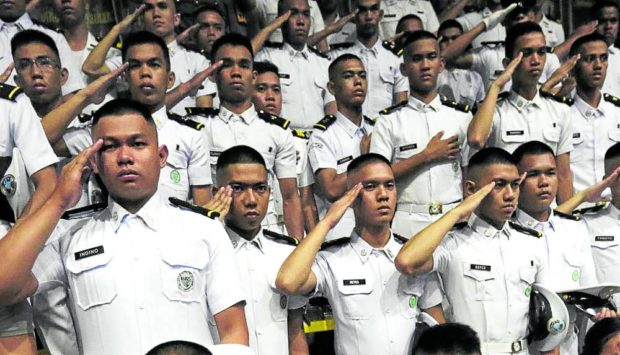50,000 Filipino seafarers risk job loss on EU vessels

ROUGH WATERS AHEAD Seafarers, such as these men in this photo taken Sept. 29, 2019, during the 23rd National Seafarers’ Day in Manila, are at great risk of not being deployed to European Union-flagged ships due to the government’s continued failure to comply with the International Convention on Standards of Training, Certification and Watchkeeping for Seafarers. —MARIANNE BERMUDEZ
The deployment of new Filipino seafarers to European Union ships and the jobs of some 50,000 others now working on EU-flagged vessels are at risk should the Philippines still fail to comply with the International Convention on Standards of Training, Certification and Watchkeeping for Seafarers (STCW Convention), the House committee on overseas workers affairs learned in a hearing on Thursday.
The committee was informed that the final evaluation by the European Maritime Safety Agency (Emsa) of the country’s STCW compliance is set in November, where the EU panel could withdraw recognition of Filipino seafarers’ qualifications to be deployed as officers on European vessels if it finds the concerns it raised years ago remain unresolved.
The deployment of Filipino seafarers to Europe will automatically stop should the Emsa make a negative finding on the country’s compliance next month, and while those currently deployed on EU-flag ships would not lose their jobs immediately, they would be allowed to work as captains, first mates, and second mates only until their STCW certificates expire.
According to Jerome Pampolina, assistant secretary for sea-based services at the Department of Migrant Workers (DMW), “the country has not been able to pass the Emsa audit since 2006, or for more than a decade,” adding that he was informed that this would be the final year for the Philippines to adopt corrective measures toward full compliance.
“If the recognition is withdrawn, the Philippines will undergo a new round of evaluation and must satisfactorily comply with the findings before the recognition is restored. Meantime, Filipino officers and ratings (the general term for skilled seafarers) will no longer be qualified to be deployed in (EU-flagged) vessels that require such certifications (and) existing certifications will be honored until their expiration,” he pointed out.
Article continues after this advertisementCiting data from the Bangko Sentral ng Pilipinas showing that Filipino seafarers send home $6.38 billion (P376.12 billion) every year, Pampolina said “this amount of remittances is also at risk should the country fail to meet the minimum global standards of maritime education, training and certification.”
Article continues after this advertisementComplacency
One in every five foreign seafarers on EU-flagged ships, mostly from Norway, Greece, Malta and Germany, is from the Philippines.Foreign Undersecretary for Migrant Workers’ Affairs Eduardo Jose de Vega lamented that the issue of Philippine compliance with the STCW “has dragged on for too long. Diplomacy has worked in the past in delaying our decertification, thus, the complacency.”
De Vega said that the Department of Foreign Affairs intends to include the STCW in the topics for discussion when President Marcos flies to Brussels, Belgium, for a visit in late December.
Maritime Industry Authority (Marina) officer in charge for the office of the executive director Samuel Batalla maintained that the agency, which is mandated to lead efforts for STCW compliance, was continuously working to address 23 discrepancies found by the Emsa in its 2020 audit.
Batalla said that the Marina and the Commission on Higher Education were working to establish updated curricula for the bachelors of science on marine transportation and on marine engineering as well as training programs that would comply with the STCW.
The Marina official pointed out that the 23 discrepancies earlier cited by the Emsa included the lack of facilities, equipment and simulators for training of seafarers as well as the absence of procedures for students who have completed their onboard training in the different maritime higher education institutions.
Deficiencies
In February this year, the European Union urged the Philippines to enhance its efforts to comply with the STCW Convention, and asked the government to submit a formal, written reply containing “concrete evidence of the measures already taken by the Philippine authorities to ensure compliance with the country’s obligations under the STCW Convention.”
Following the inspection conducted in 2020, the European Union had notified the Philippines of a number of deficiencies in the Philippine seafarers’ education, training and certification system.
“Inconsistencies have been identified in relation to the competencies covered by the education and training programs leading to the issuing of officers’ certificates, as well as in several approved programs regarding teaching and examination methods, facilities and equipment. Inconsistencies have also been identified in the monitoring of inspections and evaluations of the schools. In addition, there have been concerning findings as regards simulators and onboard training,” the European Union said earlier.
The Emsa review covered the key areas of program and course design, review and approval; monitoring, supervision and evaluation of training and assessment; examination and assessment of competence; availability and use of training facilities and simulators; onboard training, and issuance, revalidation and registration of certificates and endorsements.